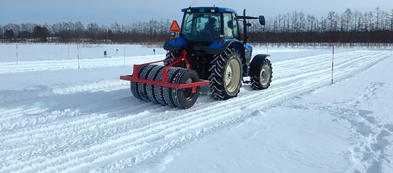National Agriculture and Food Research Organization (NARO) has clarified that winter snow compaction (commonly known as "Yuki-Fumi") reduces snow mold disease caused by snow covering winter wheat fields. Snow mold disease is more likely to occur when the soil temperature under snow remains constant at around 0℃. However, when the temperature drops due to "Yuki-fumi", the period around 0℃ is shortened and consequently the occurrence of snow mold disease is reduced. This research result is useful for stabilizing wheat production as an environmentally friendly disease control measure that does not rely on chemical pesticides.
Overview
In the areas where crops such as wheat, barley are exposed to snow for a long period, their leaves are rotten during spring snow thawing. Thereafter they suffer from snow mold disease, resulting in delayed growth and death of plants. Snow mold disease is caused by several pathogens that infects leaves which are weakened under snow.
Snow mold fungi grow at lower temperatures, avoiding competition with other microorganisms, and at around 0℃ it becomes most active against wheat plants. The snow covering the crops, contains a lot of air and has a heat-insulating effect like a quilt. Therefore, even if the atmospheric air is cold, the soil temperature under the snow is maintained at around 0℃, which creates an environment preferable for snow mold disease.
Since 2016, NARO has been investigating the occurrence of snow mold disease and measures to control the disease in winter wheat fields. As a result, it was clarified that when the air in the snow layer is released by snow compaction (or "Yuki-fumi") by pressing the snow with tire pressure rollers used in agriculture after snowfall, the soil temperature gets closer to that of cold atmospheric temperature, and the period around 0℃ is shortened, thus the occurrence of snow mold disease is reduced. It is common that the temperature must remain constant around 0℃ for certain period of time for the occurrence of the snow mold disease. Therefore, it is considered that Yuki-fumi can be an effective measure against several types of snow mold disease.
Conventionally, chemical pesticides have been used as a control measure for snow mold disease, but this study result has revealed that "Yuki-fumi" is effective in controlling snow mold disease. It is expected to become a new sustainable control measure in harmony with the environment.

Fig. Snow compaction with tire pressure rollers used in agriculture
In Hokkaido, some agricultural machinery manufacturers make tire pressure rollers on order basis.
The width of the rollers in the picture is 2.8m, but generally width of the rollers is around 5m.
Publication
Shimoda Seiji, Terasawa Yohei, Kanaya Maki, 2023, Control of snow mold damage of winter wheat by snow compaction (Yuki-fumi). Soil & Tillage Research, 225, 105554,
https://doi.org/10.1016/j.still.2022.105554
For Inquiries
Contact: https://www.naro.go.jp/english/inquiry/index.html




